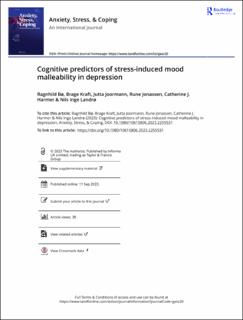Cognitive predictors of stress-induced mood malleability in depression
Peer reviewed, Journal article
Published version
Permanent lenke
https://hdl.handle.net/11250/3111435Utgivelsesdato
2023Metadata
Vis full innførselSamlinger
Sammendrag
Background & objectives: Basic attentional control, negative biases in
attention and interpretation, and rumination are all cognitive processes
associated with depression; however, less is known about their
predictive role in depressive mood reactivity and -recovery in response
to stress, and their relation to severity of depression.
Design & methods: We experimentally induced stress based on an
autobiographical imagery script in a sample of 92 participants with Major
Depressive Disorder with or without comorbid anxiety disorders. We
used simple regression analysis for investigating the roles of state- and
trait rumination, attentional networks, and attentional and interpretation
biases for predicting stress-induced depressive mood reactivity and
-recovery, respectively, and whether they in parallel mediated the
association between cognitive processes and depression severity.
Results: Stress-induced depressive mood reactivity was predicted by better
orienting ability and more state rumination. Better recovery was predicted
by better orienting efficiency and lower negative interpretation bias.
Furthermore, the relation between state rumination and depression
severity was partially mediated by depressive mood reactivity, however
limited by the lack of temporal precedence in the analysis.
Conclusions: We characterized the relation between cognitive processes
and mood malleability in response to stress. Findings could refine
theoretical models of depression if causality is established.

